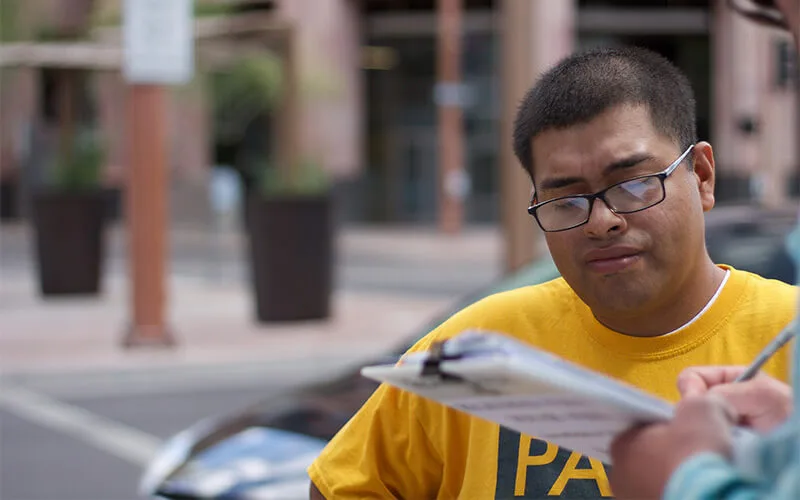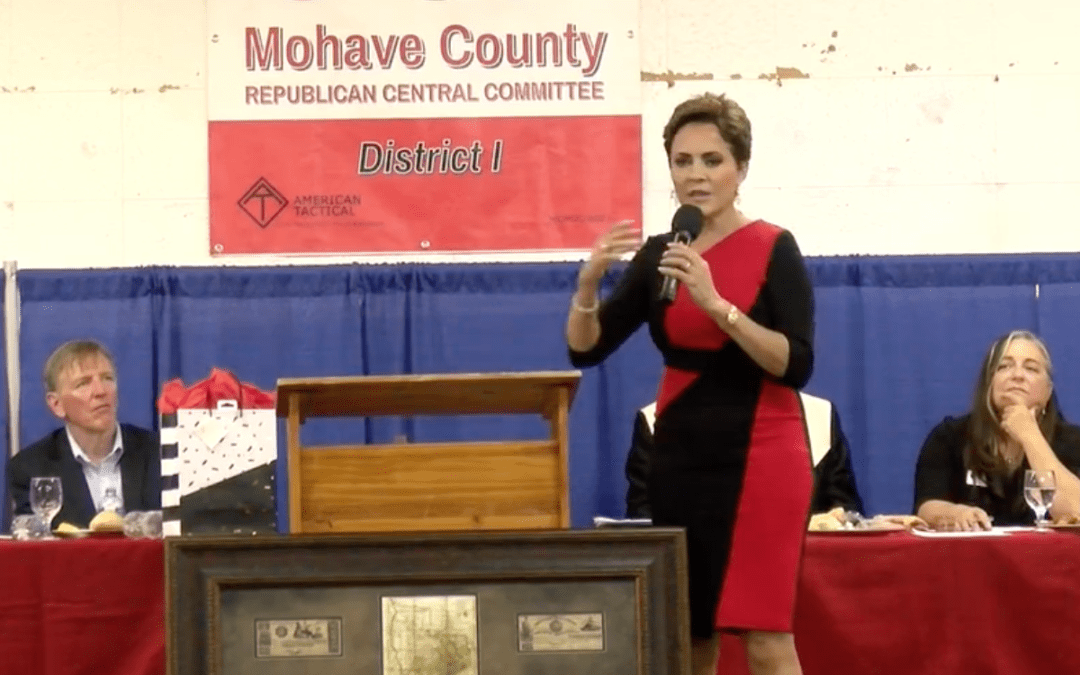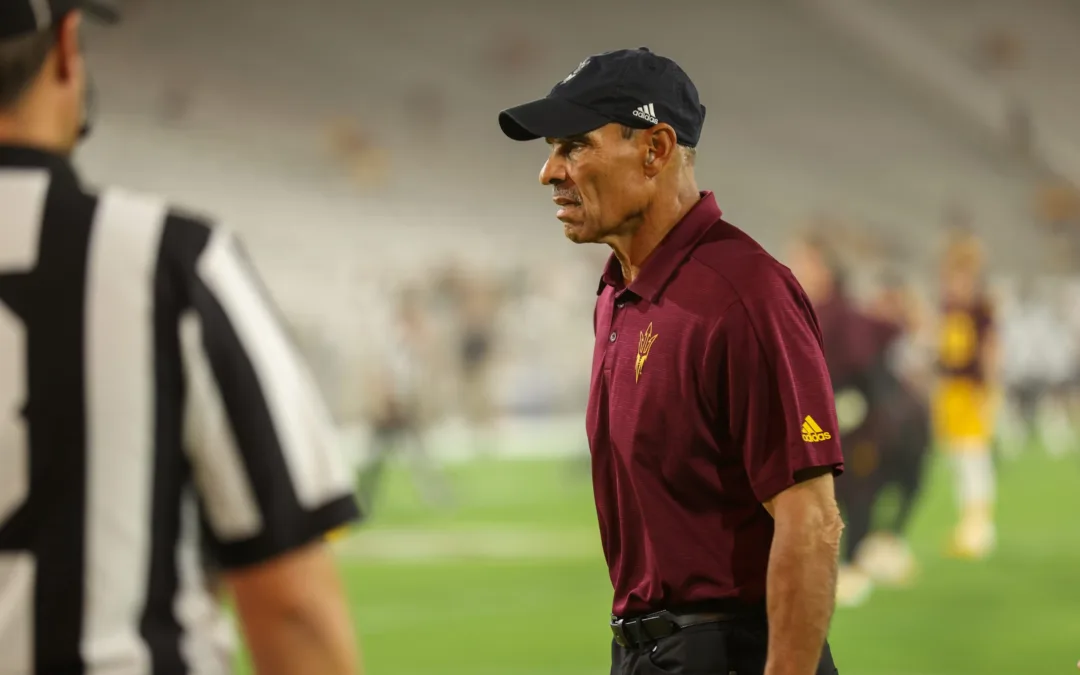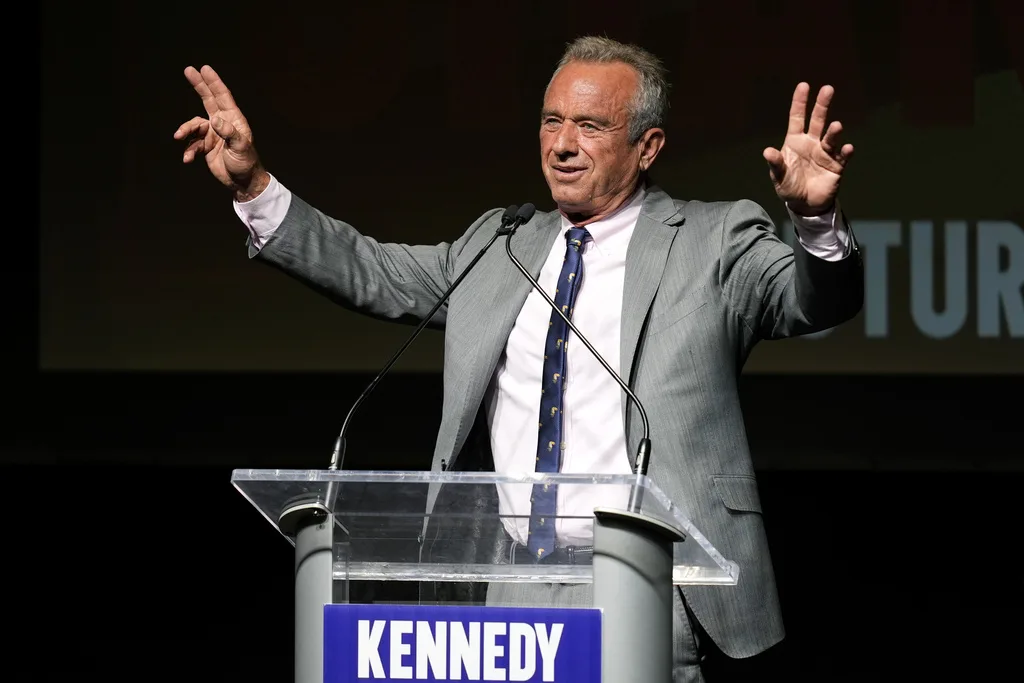
Jose Barboza, a volunteer for Promise Arizona, works to get people registered to vote. The law reversal will allow volunteers like Barboza to collect ballots door-to-door. (Photo courtesy Courtney Columbus, News21)
The 2016 rule banning the collection of mail-in ballots has been challenged in court since it was signed into law.
Update to Original Story
The 9th Circuit Court of Appeals granted Arizona Attorney General Mark Brnovich’s challenge to a court ruling made last month repealing the state’s controversial ballot collection law. Brnovich has until April 30 to submit a petition for the case to be heard by the Supreme Court.
Brnovich announced the court’s decision in a tweet on Tuesday along with a copy of the court’s order. The appeal also puts a stay on the court’s reversal of the ballot collection law, making ballot collection illegal again until the Supreme Court weighs in.
“The Ninth Circuit has just granted our request for stay in DNC v. Hobbs,” Brnovich posted on Twitter. “Arizona’s ban on ballot harvesting remains intact and we will pursue our appeal to the US Supreme Court.”
Once Brnovich submits his petition to the Supreme Court, the justices have 30 days to decide whether or not they will hear the case, or defer to the lower court’s ruling.
The reinstatement of the ballot collection ban comes one week before early ballots are to be mailed for Arizona’s Presidential Preference Election. And with the court in winter recess until Feb. 21, it is unlikely that a decision will be made before Election Day on March 17.
Original Story
The 9th Circuit Court of Appeals issued a ruling Monday that overturns Arizona’s controversial “ballot harvesting” law. The 2016 rule, or H.B. 2023, created a wide range of restrictions as to who could mail in a ballot on another’s behalf, and adversely affects people of color.
“For over a century, Arizona has repeatedly targeted its American Indian, Hispanic, and African American citizens, limiting or eliminating their ability to vote and to participate in the political process,” Judge William Fletcher stated in the appeal opinion.
He said H.B. 2023’s criminalization of the collection of another person’s ballot has a discriminatory impact on these demographics.
Rep. Michele Ugenti-Rita, the law’s author, said the bill was “important to maintaining the integrity of the electoral process.” Its passing made the act of ballot collection a felony for anyone other than members of the same household, caregivers, postal workers, and family members.
Ugenti-Rita chalked the decision up to the reaction of a “liberal court,” Capitol Times Media reported. The lawmaker dismissed the court’s justification that because there was no evidence of fraud, the law was unnecessary.
“Do I need a bunch of people to fall off a balcony before I’m like, ‘You know what’s a good idea? We should probably put up a railing,’” Ugenti-Rita said. “Or does logic and common-sense prevail (and) tells me it’s not good practice?”
In addition to the criminalization aspect, court findings revealed the law is an extension of former Republican lawmaker Don Shooter, whose 2011 legislation prohibited ballot collection. In the 2010 election where he ran against Democrat Amanda Aguirre, he received only 20% of the Latino vote in his district. Limiting ballot collection was a way to stop what he called “an effective Democratic GOTV strategy.”
But the courts found the impact of the law to be discriminatory in its implementation.
“The result of H.B. 2023 is that many thousands of minority ballots will now not be collected and counted, while white ballots will be largely unaffected,” the court declared.
The ruling also threw out a law that restricted voters’ ability to cast their ballots. The requirement for voters to cast their vote in the precinct where they preside has been in place since at least 1970. Restricting where voters can turn in ballots has resulted in long voting lines in more populated parts of the state, and in nearly 4,000 ballots being rejected in the 2016 general election. Monday’s ruling now allows voters to cast their ballots at any voting center.
“Today marks an important victory for all Arizonans,” said Arizona Democratic Party Executive Director Herschel Fink in a prepared statement. “This takes an undue burden off of working families and people of color, making it easier for them to exercise their right to vote. We are pleased that the latest effort to suppress the voices of voters by Republicans has failed.”
Defendants in the case are expected to appeal the decision to the United States Supreme Court.
Politics

Kari Lake calls on Arizona county sheriffs to enforce 1864 abortion ban
Republican candidate for US Senate Kari Lake on Saturday seemed to solidify her support for Arizona’s total abortion ban and called on county...

VIDEO: Arizona Rep. Greg Stanton ‘We will not stay silent’ on abortion ban
@coppercourier "Under this extreme law, women will die, and their doctors and nurses will be criminalized. This cannot stand," Rep. Greg...
Local News

6 terrifying things that could happen if the Comstock Act is used to target abortion
Does 1873 sound like a really, really long time ago? Well, that’s because it is—but if Republicans and far-right anti-abortion activists have their...

ASU football slapped with probation due to violations during Herm Edwards era
The violations described in the NCAA statement include impermissible in-person recruiting contacts while the state of college athletics was...




